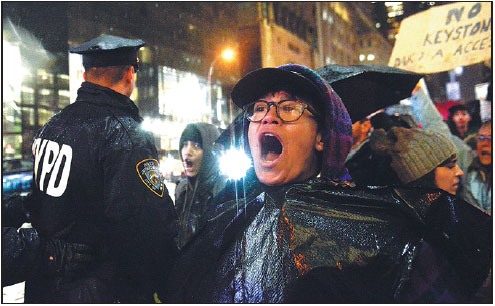Trump revives oil pipeline projects
By Agencies in Washington (China Daily) Updated: 2017-01-26 15:03US president has begun rolling out an orthodox Republican agenda
US President Donald Trump on Tuesday revived two pipeline projects blocked by his predecessor on environmental grounds, signaling his determination to undo Barack Obama's legacy.
Trump gave a conditional go-ahead to the Keystone XL pipeline - which would carry oil from Canadian tar sands to US refineries on the Gulf Coast - and an equally controversial pipeline crossing in North Dakota.
Both had been put on hold by Obama's administration.
True to his claim to be a hard-charging dealmaker, Trump said both pipeline projects would only be built subject to renegotiated terms and conditions.
"We are going to renegotiate some of the terms and, if they like, we'll see if we can get that pipeline built," he said.
Since being sworn in on Friday, Trump has begun rolling out an orthodox Republican agenda.
He has moved to curb funding for abortions, embraced Israel, frozen government hiring and sought to loosen environmental regulations.
His administration has also sought to place a tighter grip on departments that may not be sympathetic to his politics.
Trump has sought to put his populist print on policy, especially on the economy and trade.
The freshly minted president indicated that one possible focus of renegotiation for the revived pipeline projects could be who makes the actual piping.
In a separate executive order issued on Tuesday, Trump decreed that pipes should be US made.
"I am very insistent that if we are going to build pipelines in the United States the pipes should be made in the US," Trump said.
Obama had rejected a permit from Calgary-based firm TransCanada to build the 1,900-kilometer Alberta-Nebraska section of the project.
Environmentalists have assailed the project, arguing that the Alberta deposits produce some of the "dirtiest" crude in the world.
Protesters massed outside the White House late on Tuesday to vent their frustration.
"What happened today is an attack on our communities. It's an attack on our home and so we're here," said protest organizer Jade Begay of the Indigenous Environmental Network.
Dakota chill
The Dakota Access Pipeline is more of a political hot potato in the country.
Native Americans and their supporters strongly protested against the project, prompting the US Army Corps of engineers - which has approval authority - to nix the plans under the Obama administration.
Thousands of protesters had camped in freezing winter temperatures to block the pipeline's planned route which the Standing Rock Sioux Tribe said creates a risk of water pollution and endangers areas with sacred historic artifacts.
The standoff - which included some 2,000 military veterans who joined the protest - set off violent clashes with law enforcement as well as sympathetic demonstrations nationwide.
But Trump has supported the 1,900-km oil pipeline, which would snake through four US states.
Environmental groups vowed to keep fighting the pipeline in court and the Standing Rock Sioux Tribe accused Trump of violating treaty rights.
"We are not opposed to energy independence. We are opposed to reckless and politically motivated development projects ... that ignore our treaty rights and risk our water," said Dave Archambault, chairman of the group.
|
People protest against President Donald Trump’s order to allow the Keystone XL and Dakota Access pipelines in New York on Tuesday.Stephanie Keith / Reuters |
- 'Cooperation is complementary'
- Worldwide manhunt nets 50th fugitive
- China-Japan meet seeks cooperation
- Agency ensuring natural gas supply
- Global manhunt sees China catch its 50th fugitive
- Call for 'Red Boat Spirit' a noble goal, official says
- China 'open to world' of foreign talent
- Free trade studies agreed on as Li meets with Canadian PM Trudeau
- Emojis on austerity rules from top anti-graft authority go viral
- Xi: All aboard internet express












